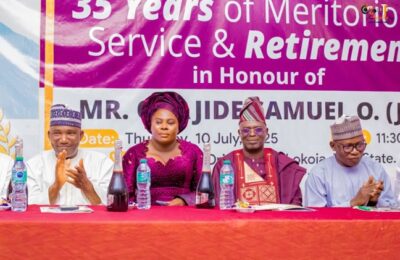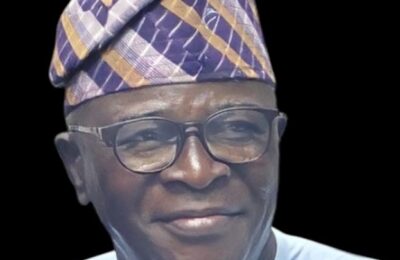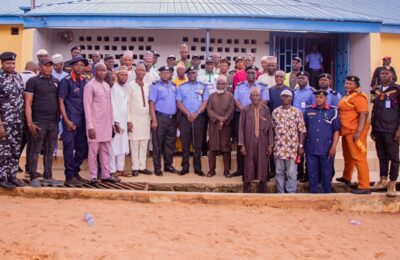In recent times, a lot of misinformation has been peddled by idle and uninformed minds on circumstances surrounding the siting of the Greenfield Refinery in Ubogiri, Kogi State, alongside other two in Lagos and Bayelsa States.
I must first of all confess that I am neither an executive or management staff or in any way connected to the Nigerian National Petroleum Company (NNPC). But I am sufficiently concerned and informed to educate the uninformed on what I know was responsible for the siting of the refineries where they have been scheduled to operate.
By NNPC records, Nigeria today has three major refineries in Port-Harcourt, Warri and Kaduna. The three of them have the capacity to produce a total of 445,000 Barrels Per Stream Day (BPSD). Broken down, it shows Port Harcourt producing the highest, 210,000 BPSD, followed by Warri with 125,000 and Kaduna 110,000.
The national consumption rate of petrol in Nigeria is put at 40 million litres per day while the amount that comes from the three refineries stands at 22 million litres per day at 100 per cent maximum production. This therefore leaves a shortfall of 18 million litres per day that is imported.
To address the losses that result from this importation, the authorities deemed it wise to establish three more refineries in Lagos, Bayelsa and Kogi in collaboration with the government of China through China State Engineering Construction Company. They are so located on the basis of sound economic consideration.
The 2010 statistical data from MEASURE DHS, NNPC and National Bureau of Statistics reveals that the South-West alone with a population rating of 20 per cent consumes 50 per cent of the petrol in this country followed by North Central, 10 per cent population and 19 per cent consumption. The South-South which consumes 17 per cent has a population of 15 per cent of the national figure. Ironically, the North West zone which has 26 per cent of the national population (the largest) consumes only 7 per cent.

In view of these facts, it would make sound economic sense to establish new refineries where the pressure or demand is highest, hence the three locations.
Lagos and Bayelsa are coastal states. It is expected that when the country is able to maximally produce refined products for the nation, the excess product can be exported using the port cities where they are sited.
As for Kogi, in view of the pressure, Kaduna alone cannot satisfy the needs of the North East, North West and North Central zones. It therefore became imperative to site one refinery in the North Central zone to cater for the pressing demands for petrol and kerosene products. Kogi became the choice, again, based on sound economic considerations.
The movement of such products will be facilitated and less expensive if the location of the refinery is situated where there are veritable infrastructures.
Ubogiri became the choice because of:
* The crude oil pipeline from Warri to Kaduna through Ajaokuta where Ubogiri is located
* The product pipeline from Warri to Kaduna through Ajaokuta
* The national gas pipeline from Oben goes to Ajaokuta
* There is a rail line that goes from Itape Iron Ore through Ajaokuta to Warri
* The River Niger passes through Ajaokuta
* The Geregu gas power plant is in the same vicinity as Ubogiri in Ajaokuta Local Government Area.
Of all these six criteria, Itobe on the eastern flank of the River Niger can only boast of the River Niger and the rail line. The other strategic and indeed eminently important considerations are absent.
To divert the above pipelines across the River Niger to Itobe on the eastern flank, in order to site the refinery, is not only a huge economic waste but a colossal marine and ecological risk. A broken pipeline will attest to the incalculable damage a venture like this will do to marine life and the economy.
Certainly it will be economically suicidal to site the refinery anywhere else in Kogi as it would not only double the cost of setting up the refinery because of non basic infrastructure, but would also take an unduly long completion time which would not augur well for the rapid development which this present administration has committed itself to. Indeed, siting it anywhere else would have amounted to economic sabotage. Fracturing the economy of the nation on the altar of sentiment is, to say the least, a monumental disservice to this nation.
For those who are advocating for a change of location or whining over the influencing factors for the siting of Ubogiri, I ask that they take heart because it is not by accident or sentiment that the choice was made. It is the product of sound and robust economic rationalization which cannot easily be faulted, no matter how much they try.
It is time for us to be grateful that we have the privilege of hosting the refinery, and strategise to make the best of this God-given economic opportunity. Rather than pursuing shadows by brooding and dissipating energy in protest over mundane issues such as location, Kogi should count itself fortunate to host one of the three new refineries in the country. Instead of thinking of how to make this project a reality for the benefit of the populace and the country, avarice and self opinionation has overtaken some ethnic bigots that have no other work but protestation.
At times such as these, our attention should be on how to maximize for our people, the anticipated derivable from this major economic project.
Let us hope that they will see reason, stop brooding, desist from setting the state backwards, realise and accept that they cannot have everything because God, the God of justice and fairness, has not ordained it so, look at the whole picture and pursue issues that would raise the state on to justifiable heights as a people with a common destiny.
Dr Adaba, OON, Ohi Etohueyi of Ebiraland, is the pioneer Director General of the National Broadcasting Commission (NBC)





